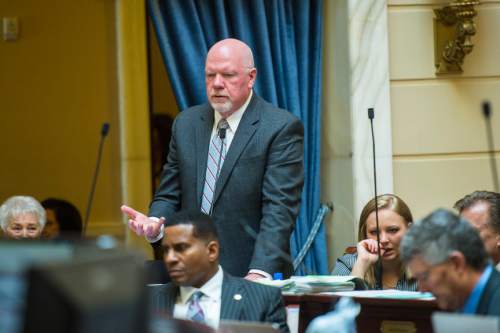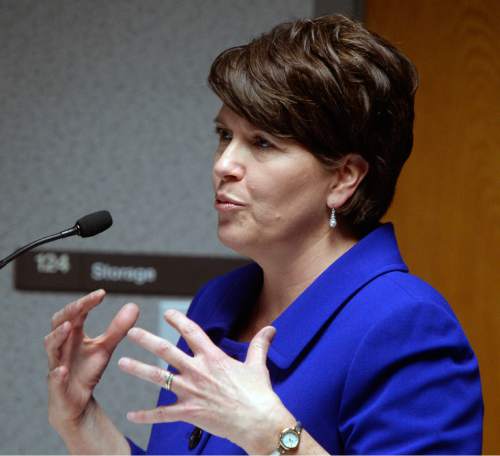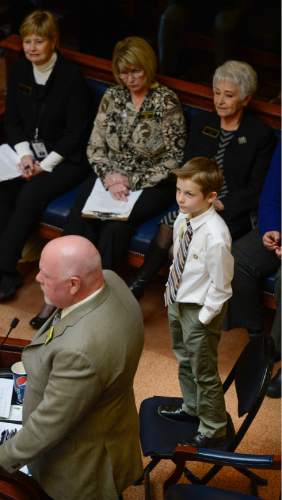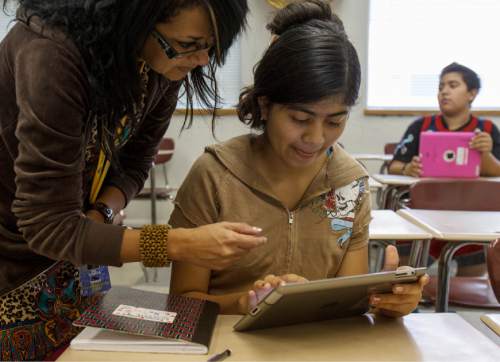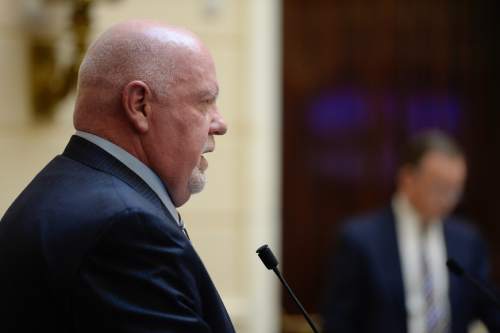This is an archived article that was published on sltrib.com in 2015, and information in the article may be outdated. It is provided only for personal research purposes and may not be reprinted.
"It's revenue, revenue, revenue!"
That's the message the Digital Learning Alliance sends in its pitches to persuade educational-technology companies to pay their dues and sign up to be part of the organization.
In return, the alliance promotes and tracks model legislation for lawmakers around the country who want to reform education and put more devices in schools. The goal is to double the amount of money spent on educational technology within three years, with the potential for millions of dollars ultimately flowing to member companies.
Plus, the alliance — until last week — offered members the chance to consult with a leader in the digital-education world: Utah Sen. Howard Stephenson.
Stephenson was prominently featured on the Digital Learning Alliance website and in promotional materials, presenting an image of the alliance working hand-in-hand with the powerful Draper Republican who is chairman of the education budget committee in Utah and holds national education-leadership roles.
Stephenson, president of the Utah Taxpayers Association, has also sponsored numerous bills over the years that have ultimately benefited partners in the Digital Learning Alliance (DLA), including several that could prove to be a windfall for them this year.
For his part, Stephenson said he has never sponsored legislation to benefit specific vendors — whether they are part of DLA or not. Instead, he is a true believer in the technology movement, and says his mission is to overcome the entrenched educational bureaucracy to get new technology into the hands of students to help them learn.
When it comes to the DLA, Stephenson says he was horrified to discover how the alliance was using his name and image in its marketing materials.
"I was just flabbergasted to think anyone could suggest that somehow they can make it happen for you," Stephenson said. "I have contacted them through my attorney and told them to take down those references to me because that's unethical at the very least and maybe illegal."
The material featuring Stephenson has since been taken down.
Dane Goodfellow, DLA's president and a former IBM executive, acknowledges he "overdid the marketing," but doesn't apologize for his zeal to implement technology in schools.
"We don't like each other," Goodfellow says of his relationship with Stephenson. "But I respect his passion and the willingness to fight."
Goodfellow says he gave up a lucrative consulting business and founded DLA in an effort to reform education and fuel America's economy.
—
The Utah model • On its website, the alliance touts the success of the "Utah Model," pumping money into educational technology, which Goodfellow says spurs economic development. It also spurs additional revenues for the technology vendors.
The site includes numerous pieces of "model legislation," bills that passed the Utah Legislature directing schools to create new programs and find new uses for educational technology — software programs that happen to be offered by the partners in the alliance.
Goodfellow says that none of the bills are directed at a single vendor; they instead create a competitive process that some of the alliance's partners bid for and win.
"My job is to improve outcomes, and I insist that the best technologies win an ecumenical [bidding process]," Goodfellow said. "If they are not selected by school districts, it's because they don't have the best technology."
DLA partners pay up to $25,000 a year for membership in the alliance, with smaller companies paying less. For all 60 companies in the alliance, the average dues are $3,300, Goodfellow said.
What DLA partners get, Goodfellow said, is a tracking of educational-technology bills in legislatures around the country and notices so they can target their marketing accordingly.
"Most small companies don't even know when a [request for proposals] is coming out, much less learning about state legislative efforts," said Goodfellow. "My members have the chance for a 'bigger piece of the pie' because I mentor them on marketing strategies. I used to consult for $200 an hour, so I'm pretty good."
Stephenson said his goal is to deploy more technology, whoever makes it.
"What I prefer is setting the captive students free of the 19th century classroom, and we're seeing the results," Stephenson said. "That's what I'll hang my hat on: the results."
But the proliferation of so-called vendor bills at the Legislature has become a matter of concern in the education community and, now, for Gov. Gary Herbert.
Herbert's spokesman, Marty Carpenter, said the practice of finding software first, then identifying a need for the program "is not a sound practice, it does not honor local control and is not an efficient use of taxpayer funds."
Often, he said, the experiments have resulted in expensive technologies "being shelved shortly after purchase because they do not meet the needs of students."
"Vendors are guaranteed to profit from the arrangement, while the benefit to schools is hit and miss," Carpenter said. "It is safe to say vendor bills will be reviewed with a particularly high level of scrutiny."
Already this session, representatives of the governor's office have spoken against several vendor-driven bills, including some sponsored or co-sponsored by Stephenson that appear to benefit partners in the DLA.
—
Case in point • This session, Stephenson sponsored SB107, which directed state schools to spend $2 million to contract with a vendor to develop a computer-science initiative for classrooms.
It came on the heels of a legislative hearing last September, where Stephenson invited representatives from Globaloria to pitch their technology for teaching computer science.
Globaloria, it so happens, had joined the DLA three months earlier, according to an announcement by the alliance.
Herbert's education adviser, Tami Pyfer, opposed Stephenson's bill when it came before the committee last month.
"It's a concern we've talked about in the governor's office," Pyfer said. "This idea of maybe a vendor that comes in or a bill that favors one or more vendors, and we put money into it from the education budget when there's really only a few schools that will benefit."
Stephenson defended SB107, saying the state could pick multiple vendors to provide the software, and the measure went on to pass the Senate. It is awaiting action in the House after clearing a committee there.
One of Stephenson's most ambitious digital initiatives, SB222, appears dead for the session. Legislative leaders have been unable to come up with the $75 million it sought to expand digital learning. Stephenson acknowledges that concerns it was an omnibus vendor bill played a part in its failure.
If it became law, Goodfellow said, a thousand companies would have bid for the various technology contracts, and maybe a hundred would have been chosen.
Goodfellow says the education establishment spread rumors about his motives and claims that vendors would benefit to torpedo SB222.
—
Utah Futures • One DLA member attempting to make inroads in Utah is Naviance. The company made a pitch to the state to buy its technology as a replacement for the existing Utah Futures program, designed to help give students online career counseling.
Stephenson has lobbied the Utah State Office of Education and the governor's office to ditch Utah Futures in favor of another program. Last May, the senator invited his colleagues to Juan Diego High School for a demonstration of the Naviance software.
"This platform presents a viable and effective alternative to the current Utah Futures system," Stephenson wrote.
The state office and the governor did not want to replace Utah Futures, but the manager of the project felt Stephenson's pressure — and his role as chairman of the committee that controls the public-education budget — left officials in a quandary, emails show.
"This is a no-win scenario," wrote Dawn Stevenson, coordinator of the state's Dropout Prevention and Career Awareness program. "If we don't try [to accommodate Naviance], he likely will not fund Utah Futures."
Stephenson said he never tried to push Naviance as a replacement to Utah Futures.
"That didn't come from me," Stephenson said.
A recent independent evaluation of Utah Futures recommended sticking with the program, and this year, the Legislature has tentatively budgeted an additional $2 million for it.
—
Shmoop • In 2013, Stephenson sponsored SB175, which allows Utah students to take the ACT college entrance exam for free. The bill included $150,000 for an online-training tool, which eventually went to a company called Shmoop, another DLA member.
Early on, there were problems with inappropriate content on the Shmoop site, but that was resolved.
This year, Rep. Brad Last, R-Hurricane, and Stephenson are looking to expand the program, seeking $1 million to provide the online tool to students who want to take Advanced Placement exams. When Last presented the bill to the House Education Committee, he was accompanied by a representative from Shmoop.
"We could look at this as a vendor bill, and I suppose it is," Last said, "but it does require the vendor be chosen through a [competitive] process."
Pyfer, on behalf of the governor's office, again testified against the legislation.
"We have a concern about what Representative Last has termed 'vendor bills' in general," said Pyfer. "... In this case, these [practice] tests are already available for free.
"This is a solution looking for a problem, and an expensive solution at that," she said. "We believe that the philosophy of finding a product first and buying it and trying to match it to a problem is the wrong way to go about it."
Stephenson contends that, by having a competitive bidding process, schools will choose the best products for their specific needs and students will benefit — and the data show that tearing down the walls of antiquated classrooms is working.
"I will defend this, and I will continue to do it as long as I am able because I think painful education has to stop," Stephenson said. "Learning should not be painful. There are those of us who have made it painful through the 19th century classroom, and I'm all about setting the captives free. Let my people learn!"
Twitter: @RobertGehrke


